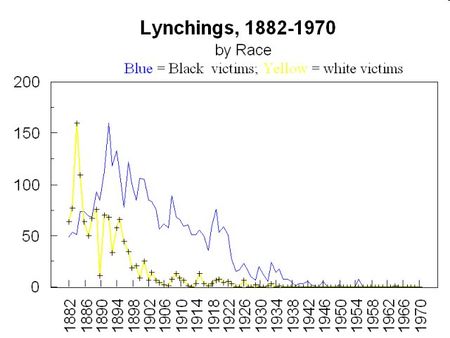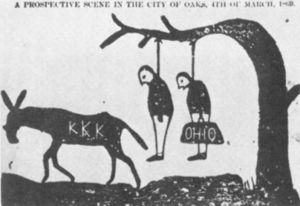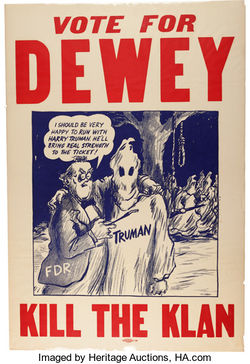Lynching
 From Conservapedia
From Conservapedia 
Source: Historical Statistics of the U.S., and is based on the 1952 Negro year Book.
Lynching refers to the assumption of extrajudicial authority, usually by Democrats, and the fatal execution of minorities or political opponents by mob rule.
Lynching attacks on African Americans, especially in the South, increased dramatically in the aftermath of Reconstruction when Republicans abolished slavery and extended Freedmen the right to vote. The peak of lynchings occurred in 1892, after white Southern Democrats regained control of state legislatures.
Former Supreme Court Justice James F. Byrnes, appointed by Franklin Roosevelt and later Secretary of State under President Harry Truman said, "rape is responsible, directly and indirectly, for most of the lynching in America."[1] Franklin Roosevelt appointed Ku Klux Klan Grand Wizard Hugo Black to the Supreme Court.[2]
Post-Reconstruction[edit]

At the turn of the 20th century, southern states passed new constitutions or Jim Crow laws which effectively disenfranchised most blacks and established segregation of public facilities by race/ Nearly 3,500 Blacks and 1,300 whites were lynched between 1882 and 1968.[4]
A large majority of Carpetbaggers joined the Republican Party coalition in southern states, along with Freedmen, free blacks, and Scalawags (native white southerners). The Republican coalition controlled every state (except Virginia) for a while; they were all overcome by Democrat and Klan violence, the coalition of Redeemers in 1870-77. The Posse Comitias Act was enacted in 1869 at the request of Republican President Ulysses S. Grant to empower him to use federal troops to suppress the Ku Klux Klan during Reconstruction. The original version of this law said that it was the duty of the President to use the armed forces or militia to respond to insurrection, domestic violence, unlawful combination, or conspiracies that deprive any portion or class of people their Constitutional rights and privileges when state authorities are unable or refuse to protect such people.
The Insurrection Act empowers the President, either upon his own initiative or at the request of a governor to use federal troops to address a variety of civil disturbances that could be provoked by a major terrorist attack. Sections 332 and 333 make it clear that it is up to the President to determine when and where to use federal troops to enforce the laws.[5]
The first federal anti-lynching legislation was introduced by Republicans in 1905 and overcame Democrat filibusters in 1922 and was signed into law by Republican President Warren Harding. Democrat filibusters against strengthening the law continued however; President Franklin Roosevelt always opposed Republican civil rights bills and anti-lynching legislation throughput the New Deal. Even the appearance in the newspapers of the lynching of Rubin Stacy failed to change Roosevelt's mind on the subject. Six deputies were escorting Stacy to Dade County jail in Miami on July 19, 1935, when he was taken by a white mob and hanged by the side of the home of Marion Jones, the woman who had made the original complaint against him. The New York Times later revealed that "subsequent investigation revealed that Stacy, a homeless tenant farmer, had gone to the house to ask for food; the woman became frightened and screamed when she saw Stacy's face."[6] The Costigan–Wagner Act had wide support; however, the bill was defeated in 1935. Other congressional anti-lynching bills were introduced and persistently were blocked by Southern Democrats in 1935, 1937, 1938 and 1940.
High tech lynching[edit]
In 1992, in the early days of email and internet discussion groups, Supreme Court nominee Clarence Thomas was the victim of a high-tech lynching. Thomas had been nominated to the High Court by Republican President George H.W. Bush. Democrat Sen. Joseph R. Biden of Delaware was one of the foremost lynching agitators.
Racist liberals attempted to block Thomas' nomination to the High Court through a series of public guilt by association smears.[7] Sen. Biden agreed to hold a series of racially motivated hearings dubbed "the Anita Hill hearings" which have been described as a leftist "high tech lynching for uppidy blacks."[8]
In a flagrant violation of the rules of the Senate,[9] staff members[10] for a sitting Democratic member of the Judiciary Committee leaked a routine confidential FBI background report to Nina Totenberg of National Public Radio (NPR)[11] which contained a vicious defamatory smear intended to mar Thomas for life. The accusation was known to be false, and was concocted to publicly intimidate an African-American Republican from accepting an appointment to the nation's High Court, and derail his nomination. None of the allegations could be substantiated. The deliberate falsehoods did however persuade Ku Klux Klan Grand Cyclops and Democratic Senator Robert Byrd to change his vote from "yes" for confirmation to "no".
Liberals continued to smear Thomas and uncritically believe Hill's claims.[12]
21st century[edit]
Far leftists have advocated the lynching of College Republicans.[13][14]
See also[edit]
References[edit]
- ↑ https://segregationinamerica.eji.org/report/segregation-forever-leaders.html
- ↑ https://newsinteractive.post-gazette.com/thedigs/2012/09/04/ray-sprigles-pulitzer-winning-story-on-the-front-page-of-the-post-gazette/
- ↑ Hubbs, Guy W. (May 15, 2015). "Searching for Freedom after the Civil War: Klansman, Carpetbagger, Scalawag, and Freedman". University Alabama Press.
- ↑ Lynchings: By State and Race, 1882–1968. Statistics provided by the Archives at Tuskegee Institute. University of Missouri-Kansas City School of Law. [1]
- ↑ https://www.sofmag.com/understanding-the-posse-comitatus-act-and-the-insurrection-act-the-posse-comitatus-act/
- ↑ https://www.naacp.org/naacp-history-costigan-wagner-act/
- ↑ A Few Facts About Clarence Thomas, Chip Berlet, Political Research Associates, Cambridge MA, 1997. Chip Berlet of Political Research Associates noted that Thomas was on the editorial board of the Lincoln Review, a quarterly black conservative publication of the Lincoln Institute. Berlet issued a rather dubious ad hominem attack which claimed "it is a far right group that has worked in coalition with… fascist and anti-Semitic groups," and goes on to "link" Lincoln Institute head J. A. Baker with the Indiana Ku Klux Klan by virtue that Baker is on the board of the Council for National Policy and another board member is supposedly a former Klan member.
- ↑ Clarence Thomas Hearings: Biden Questions Thomas 1
- ↑ Congressional Record -Senate, 102nd Congress, October 7, 1991, Vol 137, Part 18, p. 25706.
- ↑ The Real Anita Hill. University of Iowa (March 1992).
- ↑ The Clarence Thomas Hearings, by William Boot, Columbia Journalism Review, January/February 1992.
- ↑ McManus, John F. (May 1, 2019). Are There No Defenders of Clarence Thomas? The New American. Retrieved May 1, 2019.
- ↑ http://www.patheos.com/blogs/davidclarke/2017/04/berkeley-vandals-call-beheading-college-republicans/?utm_campaign=shareaholic&utm_medium=twitter&utm_source=socialnetwork
- ↑ http://www.dailycal.org/2017/04/13/campus-graffiti-issues-threaten-berkeley-college-republicans/
Categories: [United States History] [Democratic Party] [Reconstruction] [Progressive Era] [Racism] [White Supremacy] [Crimes] [Murder] [Terrorism]
↧ Download as ZWI file | Last modified: 02/17/2023 23:54:31 | 21 views
☰ Source: https://www.conservapedia.com/Lynching | License: CC BY-SA 3.0
 ZWI signed:
ZWI signed:
 KSF
KSF